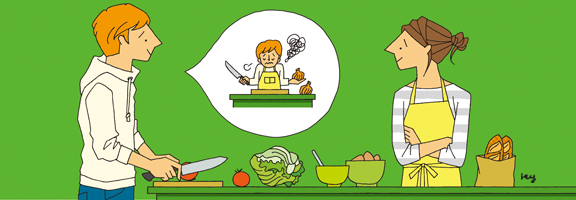会話を学ぶ「英会話講座」
2016.4.6
料理は僕に任せて!

<ChristaとボーイフレンドのDarrenがキッチンで花見に持っていくお弁当を準備しています。>
EnglishJapanese
Darren:Ouch, I cut myself again.
Christa:[laughs] Maybe I should handle the knife…
Darren:It’s alright. I’ve got it.
Christa:Are you sure? I don’t mind doing it.
Darren:Yeah, I’m sure. Practice makes perfect, right?
Christa:I suppose. Let me know if you need any help.
Darren:Of course. You know, I really took to heart what you said the other day.
Christa:Hm? What was that?
Darren:Well, remember when we were making dinner together?
Christa:Oh, yeah! I told you that you couldn’t chop an onion to save your life, didn’t I? Sorry about that.
Darren:[laughs] Don’t worry about it! It just made me think that I should really work on my cooking skills.
Christa:[laughs] Maybe I should handle the knife…
Darren:It’s alright. I’ve got it.
Christa:Are you sure? I don’t mind doing it.
Darren:Yeah, I’m sure. Practice makes perfect, right?
Christa:I suppose. Let me know if you need any help.
Darren:Of course. You know, I really took to heart what you said the other day.
Christa:Hm? What was that?
Darren:Well, remember when we were making dinner together?
Christa:Oh, yeah! I told you that you couldn’t chop an onion to save your life, didn’t I? Sorry about that.
Darren:[laughs] Don’t worry about it! It just made me think that I should really work on my cooking skills.
Darren:痛い、また手を切っちゃったよ。
Christa:[笑いながら] 包丁は私がやったほうがいいかも…
Darren:大丈夫。僕に任せて。
Christa:本当に?私は構わないよ、やってあげても。
Darren:本当に大丈夫。習うより慣れろって言うだろ?
Christa:まあそうだけど。手伝ってほしかったら言ってね。
Darren:ああ、そうするよ。でもね、この前言われたこと、本当に肝に銘じてるから。
Christa:えっ?何だっけ?
Darren:ほら、一緒に夕飯作ったときのこと覚えてるだろ?
Christa:あっ、覚えてる!あなたがどんなに頑張ってもタマネギ刻んだりできないわ、って言ったっけ?ごめんね、あんなこと言って。
Darren:[笑いながら] そんなの気にしなくていいよ。おかげで本気で料理の腕を上げなきゃって思うようになれたから。
Christa:[笑いながら] 包丁は私がやったほうがいいかも…
Darren:大丈夫。僕に任せて。
Christa:本当に?私は構わないよ、やってあげても。
Darren:本当に大丈夫。習うより慣れろって言うだろ?
Christa:まあそうだけど。手伝ってほしかったら言ってね。
Darren:ああ、そうするよ。でもね、この前言われたこと、本当に肝に銘じてるから。
Christa:えっ?何だっけ?
Darren:ほら、一緒に夕飯作ったときのこと覚えてるだろ?
Christa:あっ、覚えてる!あなたがどんなに頑張ってもタマネギ刻んだりできないわ、って言ったっけ?ごめんね、あんなこと言って。
Darren:[笑いながら] そんなの気にしなくていいよ。おかげで本気で料理の腕を上げなきゃって思うようになれたから。
キーフレーズ
“get (it /something)” ~は任せて
この表現はある作業などを引き受ける用意があることを相手に伝える際に使われます。“I’ve got it”という形で、相手に助力を申し出るような場面でよく使われます。“leave it to me”と言っても、ほぼ同じ意味になります。
例)Elizabethは友人Ryanがマフラーを編むのを手伝っています。
Ryan:I just can’t seem to figure out how this part works.
Elizabeth:Here, pass it to me. I’ve got it.
Ryan:ここのところがどうやったらうまく編めるのかわからないな。
Elizabeth:ほら、貸してよ。私に任せて。
Ryan:I just can’t seem to figure out how this part works.
Elizabeth:Here, pass it to me. I’ve got it.
Ryan:ここのところがどうやったらうまく編めるのかわからないな。
Elizabeth:ほら、貸してよ。私に任せて。
“practice makes perfect” 習うより慣れろ
難しい技能などを身につけようとしている人に対して、努力を続けるよう励ます際によく使われる表現です。最初はうまくできなくても繰り返しやり続けることによっていずれはその技能などを習得できるようになるということを意味しています。
例)Imaniが妹のRinaにテニスを教えています。
Rina:[sighs] I should just give up. I’m never going to be as good as you.
Imani:Come on! Just one more match. Practice makes perfect.
Rina:[ため息をついて] やめたほうがいいかも。お姉ちゃんみたいにうまくは絶対なれないわ。
Imani:何言ってるのよ!習うより慣れなさい!
Rina:[sighs] I should just give up. I’m never going to be as good as you.
Imani:Come on! Just one more match. Practice makes perfect.
Rina:[ため息をついて] やめたほうがいいかも。お姉ちゃんみたいにうまくは絶対なれないわ。
Imani:何言ってるのよ!習うより慣れなさい!
“take (something) to heart” ~を真剣に受け止める
人の発言や行為などを重く受け止めている様子を言い表すフレーズです。助言などを深く心に刻み、それに従いたいと感じているような場面でよく使われます。
例)Kyleは親友Kevinから与えられた助言を真剣に受け止めているようです。
Kyle:I really took what you said to heart. I’ve got to prioritize my studies.
Kevin:Hey, that’s great! Want to meet in the library tomorrow to study for next week’s test?
Kyle:お前の言葉が本当に身にしみたよ。勉強を最優先にしないといけないな。
Kevin:そりゃ、よかった。明日、図書館で来週の試験に備えて勉強でもするか?
Kyle:I really took what you said to heart. I’ve got to prioritize my studies.
Kevin:Hey, that’s great! Want to meet in the library tomorrow to study for next week’s test?
Kyle:お前の言葉が本当に身にしみたよ。勉強を最優先にしないといけないな。
Kevin:そりゃ、よかった。明日、図書館で来週の試験に備えて勉強でもするか?
“to save one’s life” どうしても~できない
直訳すれば「自分の命を救うために」という意味になるこの表現は、“can’t”や“couldn’t”と一緒に用いて、ある行為などをどうしてもうまくできないことを言う際に使います。たとえ生死が関わるような状況であってもその行為うまくできないという誇張表現です。“won’t”とともに使えば、生死が関わる場面であっても、その行為をするつもりがないという意味になります。例えば、“She won’t eat mushrooms to save her life.”(彼女はキノコを死んでも食べない)といった使い方をします。
例)転んでしまったQuinnのところに、たまたま通りかかったPaulが駆け寄ってきました。
Paul:[helps Quinn stand up] Are you OK? That looked like a pretty bad fall.
Quinn:Yeah, I’m alright. I just can’t rollerblade to save my life!
Paul:[Quinnが立ち上がるの助けながら] 大丈夫?ひどい転び方だったけど。
Quinn:ええ、大丈夫よ。ローラーブレードは私には絶対無理だわ!
Paul:[helps Quinn stand up] Are you OK? That looked like a pretty bad fall.
Quinn:Yeah, I’m alright. I just can’t rollerblade to save my life!
Paul:[Quinnが立ち上がるの助けながら] 大丈夫?ひどい転び方だったけど。
Quinn:ええ、大丈夫よ。ローラーブレードは私には絶対無理だわ!


 【Gabaからのお知らせ】
【Gabaからのお知らせ】 【特集】
【特集】 【英単語の正しい使い分け】
【英単語の正しい使い分け】 【使いこなす句動詞】
【使いこなす句動詞】